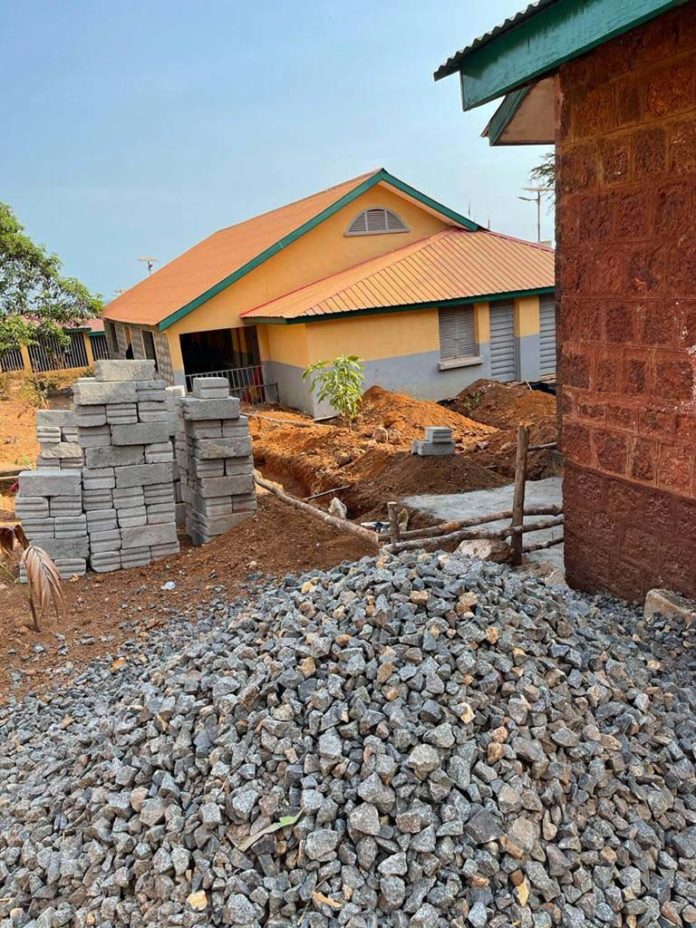I recently visited the Sierra Leone Psychiatric Teaching Hospital (formerly Kissy Mental hospital), and I can’t tell you how impressed I was by what the Ministry of Health is doing there. The MoHS, through a solid collaboration with Partners In Health, has overhauled and transformed the facility and now equipped it with decent beds, running water, and constant electricity. The ministry periodically assigns professional healthcare workers who treat patients with dignity and respect. I found nurses and other healthcare professionals playing and telling jokes with patients. The facility now looks more like a treatment and rehabilitation center than the prison and mental colony it used to be. The experience is something I don’t get to often see in the many psychiatric hospitals I have visited across Africa.
Right from the entrance, you can tell how much has changed. There is a massive increase in the number of families taking their loved ones to the center for regular checks because they are confident about the level of treatment and respect patients now receive there. I found more students willing to pursue careers in mental health.
Why does this matter?
Transforming the Sierra Leone Psychiatric Teaching Hospital has long been overdue, but our country’s current efforts come at a very significant phase. Still reeling from decades of trauma caused by the civil war, natural disasters, and other internally inflicted trauma from political instability and poor leadership, there’s a spike in drug and alcohol use in Sierra Leone in the last few years, especially among young people. These days, you don’t need to go to the “hoods” or slums to talk to drug and alcohol abusers. Spending a few hours at a bar or club in places like Lumley beach road will reveal this sad reality. While Lumley Beach Road remains one of our country’s prestigious locations and tourist destinations, it is becoming a drug and alcohol consumption point. This is an even bigger problem for the Sierra Leone Police.
I met senior police officers who said they now work extra time and remain even more vigilant on weekends along Lumley Beach road and other neighborhoods. The police said the number of road accidents and random fights, especially along beach road, has increased, with many cases related to drunkenness or being high on drugs. The Aberdeen police station receives such cases every weekend and on most weekdays. Some police officers consider it a national security problem.
The sight of young people indulging in alcohol and drugs is
scary and threatens Sierra Leone’s future. I sat with some users who said they take alcohol and drugs to escape from the realities around them. Others say to help them relax or give them a higher vibe.
Dr. Abdul Jalloh, the Specialist Psychiatric and Care Manager at the Sierra Leone Psychiatric Teaching Hospital, said, even though many users see drugs and alcohol as the solution to the problems around them, the effect provides “a two-way traffic – depression leading to more drug abuse, and drug abuse causing more depression, and other mental disorders.”
In the past, family members generally condemn people suffering from mental disorders due to the country’s lack of proper treatment and care. Now the work of Dr. Abdul Jalloh, Abdul Kargbo, the executive director of the National Drug Law Enforcement Agency, along with the Ministry of Health and Sanitation and its partners, have seen massive transformation at the Sierra Leone Psychiatric Teaching Hospital in the last three years alone. The efforts also led to increased collaboration between the ministry of health and major international organizations like the United Nations Office on Drugs and Crime (UNODC), the West Africa Epidemiology Network on Drug Use, the African Union Pan African Epidemiology Network on Drug Use, and the International Consortium of Universities on Drug Demand Reduction. These collaborations are HUGE for us as a country.
Through the collaboration, ECOWAS recently supported the hospital and National Drug Law Enforcement Agency (NDLEA) to train about 31 core drug educators on how to prevent drug abuse. There is currently another training on reducing drug demand and developing a universal treatment curriculum for healthcare professionals as part of drug treatment and rehabilitation. ECOWAS provided additional support for refurbishing the drug treatment and rehabilitation center in the hospital, which the Government of Sierra Leone will soon commission.
Tackling mental health problems is critical to the development of every nation, and the steps taken by the ministry of health (and its partners) are vital in overcoming Sierra Leone’s mental health problems. And hopefully, with these new developments, the ministry of health will allocate more resources on early interventions through prevention, promotion of well-being, and increasing investment in primary healthcare. But most importantly, the government will also work on other areas in the country to improve the lives of citizens because that is the only way to sustain these efforts by the ministry of health.
Pétit-a-pétit, we will get there. I, personally, don’t subscribe to the saying that Rome wasn’t built in a day. We will build our Rome overnight if willing and committed people lead in the right places or positions.
